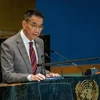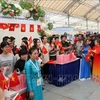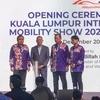Vietnamese Deputy Foreign Minister Pham Quang Vinh is joining other senior officials, scholars and researchers from the 10 ASEAN member countries and China in a forum marking the 10th anniversary of the ASEAN-China Strategic Partnership, which opened in Bangkok on August 2.
Addressing the event, Deputy FM Vinh shared his positive view on ASEAN-China relations, affirming that the strategic partnership is one of the important pillars of the region.
He said the promotion of ties not only benefits both sides, but also makes significant contributions to common peace, stability and development in the region.
In the future, ASEAN and China should maintain and strengthen measures to build mutual trust and understanding, consider it as an important basis to nurture their sound cooperation and long-lasting stability, as well as to settle existing differences between the two sides, he stressed.
He voiced his support for the implementation of commemorative activities, while suggesting ways to further the ASEAN-China strategic partnership, especially in the fields of mutual interest such as economics, trade, investment, connectivity, development and the response to non-traditional security challenges.
The diplomat underscored the need to conform to international law and the 1982 United Nations Convention on the Law of the Sea, as well as the settlement of disputes through peaceful methods, the full and effective implementation of the Declaration on Conduct of Parties in the East Sea (DOC), and the early formation of a Code of Conduct in the East Sea (COC), thus contributing to the common development of the ASE AN-China strategic partnership for peace, stability and development.
During the forum, participants agreed that since ASEAN and China set up their dialogue relations in 1991, and in the past decade particularly, political confidence among countries has been strengthened, while their economic, trade and investment cooperation has been increasingly developed, expanding to various fields.
At the same time, people-to-people diplomacy and cultural exchanges have also been stepped up, they said.
China is now the leading trade partner of ASEAN, while the latter is the third largest trade partner of the former, with two-way trade hitting 400 billion USD in 2012, they noted.
Delegates at the event proposed measures to further consolidate ASEAN-China ties in the future, focusing on the boosting of dialogues, consultations and cooperation in politics and security for peace, stability and development.
They highlighted the need to promote economic, trade and investment cooperation by more effectively implementing agreements and commitments in the framework of the ASEAN-China Free Trade Agreement, while strengthening efforts to conclude negotiations on the Regional Comprehensive Economic Partnership (RCEP), striving for two-way trade of 500 billion USD in 2015.
They also underscored the necessity to make full use of existing mechanisms such as the ASEAN-China Centre and ASEAN-China Fair, with a view to furthering connectivity, people-to-people and cultural exchanges, business linkage and education cooperation.
It is essential to foster maritime cooperation, strengthen coordination in dealing with issues relating to non-traditional security challenges such as climate change, natural disasters, pandemics, and energy and food security, they said.
They shared the significance of the partnership and cooperation between the association and China in the maintenance of peace, stability and security in the East Sea .
They emphasized that it is crucial to strengthen dialogues and consultations, peacefully settling disputes in the East Sea based on international law and the 1982 UNCLOS, conforming to agreed principles and commitments while preventing the disputes from impacting on general relations and cooperation between ASEAN and China as well as peace, stability and development in the region.
Based on achievements gained during the implementation of DOC, participants lauded ASEAN and China ’s will to conduct consultations on COC this September and expressed their hope that the two sides will finalise the document at an early date.
Addressing the event, Chinese Foreign Minister Wang Yi affirmed his country’s constant policy to build a friendly neighbourliness and mutually beneficial cooperation with ASEAN. China considers the grouping as a priority in its foreign policy and supports the bloc’s central role in regional architecture, he said.
He affirmed that China wants to and is willing to continue working together with ASEAN to settle peacefully disputes in the East Sea. He said China commits itself to continue implementing DOC in a full manner and heading towards the building of COC, thus making East Sea a region of peace and cooperation.
The Association of Southeast Asian Nations (ASEAN) groups Brunei, Cambodia, Indonesia, Laos, Malaysia, Myanmar, the Philippines, Singapore, Thailand, and Vietnam.-VNA
Addressing the event, Deputy FM Vinh shared his positive view on ASEAN-China relations, affirming that the strategic partnership is one of the important pillars of the region.
He said the promotion of ties not only benefits both sides, but also makes significant contributions to common peace, stability and development in the region.
In the future, ASEAN and China should maintain and strengthen measures to build mutual trust and understanding, consider it as an important basis to nurture their sound cooperation and long-lasting stability, as well as to settle existing differences between the two sides, he stressed.
He voiced his support for the implementation of commemorative activities, while suggesting ways to further the ASEAN-China strategic partnership, especially in the fields of mutual interest such as economics, trade, investment, connectivity, development and the response to non-traditional security challenges.
The diplomat underscored the need to conform to international law and the 1982 United Nations Convention on the Law of the Sea, as well as the settlement of disputes through peaceful methods, the full and effective implementation of the Declaration on Conduct of Parties in the East Sea (DOC), and the early formation of a Code of Conduct in the East Sea (COC), thus contributing to the common development of the ASE AN-China strategic partnership for peace, stability and development.
During the forum, participants agreed that since ASEAN and China set up their dialogue relations in 1991, and in the past decade particularly, political confidence among countries has been strengthened, while their economic, trade and investment cooperation has been increasingly developed, expanding to various fields.
At the same time, people-to-people diplomacy and cultural exchanges have also been stepped up, they said.
China is now the leading trade partner of ASEAN, while the latter is the third largest trade partner of the former, with two-way trade hitting 400 billion USD in 2012, they noted.
Delegates at the event proposed measures to further consolidate ASEAN-China ties in the future, focusing on the boosting of dialogues, consultations and cooperation in politics and security for peace, stability and development.
They highlighted the need to promote economic, trade and investment cooperation by more effectively implementing agreements and commitments in the framework of the ASEAN-China Free Trade Agreement, while strengthening efforts to conclude negotiations on the Regional Comprehensive Economic Partnership (RCEP), striving for two-way trade of 500 billion USD in 2015.
They also underscored the necessity to make full use of existing mechanisms such as the ASEAN-China Centre and ASEAN-China Fair, with a view to furthering connectivity, people-to-people and cultural exchanges, business linkage and education cooperation.
It is essential to foster maritime cooperation, strengthen coordination in dealing with issues relating to non-traditional security challenges such as climate change, natural disasters, pandemics, and energy and food security, they said.
They shared the significance of the partnership and cooperation between the association and China in the maintenance of peace, stability and security in the East Sea .
They emphasized that it is crucial to strengthen dialogues and consultations, peacefully settling disputes in the East Sea based on international law and the 1982 UNCLOS, conforming to agreed principles and commitments while preventing the disputes from impacting on general relations and cooperation between ASEAN and China as well as peace, stability and development in the region.
Based on achievements gained during the implementation of DOC, participants lauded ASEAN and China ’s will to conduct consultations on COC this September and expressed their hope that the two sides will finalise the document at an early date.
Addressing the event, Chinese Foreign Minister Wang Yi affirmed his country’s constant policy to build a friendly neighbourliness and mutually beneficial cooperation with ASEAN. China considers the grouping as a priority in its foreign policy and supports the bloc’s central role in regional architecture, he said.
He affirmed that China wants to and is willing to continue working together with ASEAN to settle peacefully disputes in the East Sea. He said China commits itself to continue implementing DOC in a full manner and heading towards the building of COC, thus making East Sea a region of peace and cooperation.
The Association of Southeast Asian Nations (ASEAN) groups Brunei, Cambodia, Indonesia, Laos, Malaysia, Myanmar, the Philippines, Singapore, Thailand, and Vietnam.-VNA



















